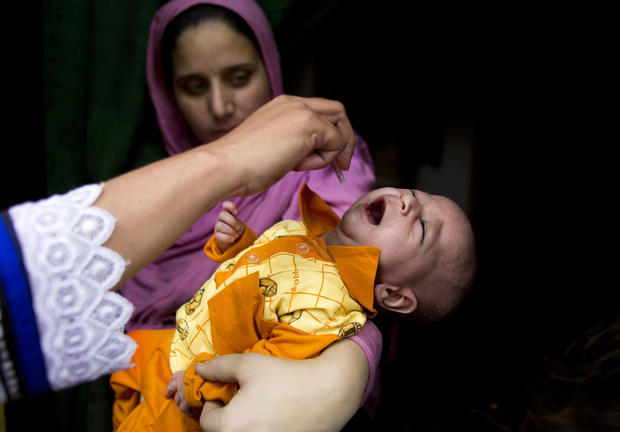Pakistan PM vows to eradicate polio, but skeptics abound
ISLAMABAD - Pakistan's prime minister Nawaz Sharif on Wednesday promised to oversee the eradication of polio from the nation in just six months, prompting criticism over his ability to deliver his commitment.
Presiding over a meeting of senior officials responsible eliminating the disease, Sharif warned he would "not tolerate negligence" during an anti-polio campaign that the country plans to launch this month, according to an official statement. Pakistan is one of three countries, including Nigeria and Afghanistan, facing the spread of polio.
Polio is a highly debilitating disease caused by a virus which invades the nervous system of the body, typically paralyzing the legs of children under the age of five. According to the World Health Organization, cases of polio have decreased by more than 99 percent since 1988, from an estimated 350,000 cases to 416 cases reported in 2013. Since January this year, at least 235 cases of polio have been reported from Pakistan.
The failure to curb polio is widely seen as the consequence of a failure by Pakistani authorities to stand up to the threat from Taliban militants and other radical Islamists opposed to plans for giving drops of an anti-polio medication to preschool aged children. The opposition stems from a belief shared by Islamists that giving of anti-polio drops is part of a Western conspiracy to make Muslim children impotent.
"It is this crazy notion without any scientific evidence that has generated so much opposition from Pakistan" said a senior UN official in Islamabad who spoke to CBS News on condition of anonymity. In the past, volunteers dedicated to giving anti-polio drops have been fired upon by suspected Islamists in different parts of Pakistan, seeking to disrupt the campaign.
Analysts warned Sharif's promise appeared to be no more than a populist ploy rather than part of a well-thought-out plan to end the crippling disease in Pakistan.
"Can the prime minister tell us, what has his government done constructively in the last six months that has helped to defeat the opposition [to anti-polio drops]" said Hasan Askari Rizvi, a Pakistani commentator on political and security affairs. "The Pakistani state remains weak and apparently unable to deal with this challenge. The prime minister's statement is not convincing enough."
A Western ambassador based in Islamabad who also spoke to CBS News on condition of anonymity said Sharif's failure to deliver on his promise creates the risk of further undermining the Pakistani government's position.
"If, as I suspect will be the case, there is little convincing progress in six months from now, the government and the prime minister will look like a joke" he said. "Its much much easier to come out with a bold promise. But can someone please explain to me exactly how this [successful anti-polio campaign] will be done."
Sharif's promise appeared to have failed in dampening widespread public skepticism over the issue.
Fazil Khan, a paramedic who works at a private Islamabad clinic said Sharif was seeking to build up his popularity in an area which is widely discussed, especially among Pakistanis traveling abroad.
"Pakistanis who travel outside their country must carry a polio certificate," said Khan. "It's a very disgusting experience to be among the very small group of countries suffering from polio.
"Its just our own fault that we have failed."
